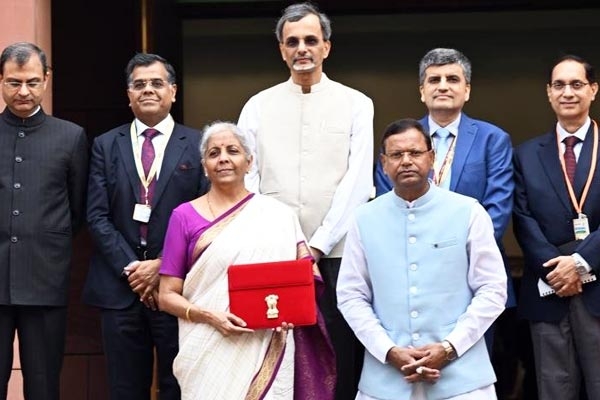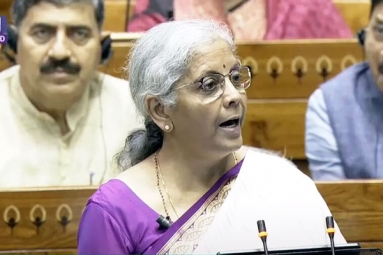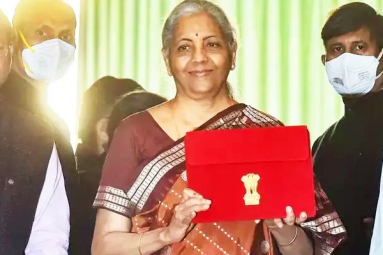
(Image source from: x.com/DDNewslive)
The Finance Minister's new Budget for the Modi 3.0 government has been announced. This Budget presents a mixed bag for different stakeholders. While it may be challenging for investors, it offers positive changes for job creation and aligns with key political priorities. Notably, the Finance Minister has increased the tax rates on short-term capital gains to 20% and long-term capital gains to 12.5%. Additionally, to moderate the enthusiasm in the derivatives market, the government has raised the security transaction tax (STT) on futures and options to 0.02% and 0.1%, respectively. Furthermore, any income received from the buyback of shares will now be taxed in the hands of the recipient. For salaried individuals, the Finance Minister has announced revisions to the tax structure under the new regime. The standard deduction has been increased from Rs. 50,000 to Rs. 75,000, which will provide relief to salaried taxpayers and pensioners. However, the standard deduction will remain unchanged at Rs. 50,000 under the old tax regime. The Finance Minister estimates that the new tax changes will result in a revenue forgone of Rs. 29,000 crore in direct taxes. In the broader macroeconomic context, the Finance Minister stated that the central government has targeted a fiscal deficit of 4%.
The government's fiscal deficit target is much lower than the earlier 5.8% estimate, now set at 5.1% in the interim budget. Despite this significant reduction, the budget introduced no major policy changes or new benefits for the middle class. However, the Prime Minister highlighted the 'Employment Linked Incentive scheme,' which aims to create job opportunities by providing the first salary to those entering the workforce, and allowing youth from villages to work as apprentices in top companies.
Furthermore, the budget proposes several reductions in customs duties, including a drop to 15% on mobile phones and chargers, 6% on gold and silver, and 6.5% on platinum. Three additional cancer treatment drugs will also be exempted from customs duties. Customs duties on certain seafood, solar energy parts, ferronickel, and blister copper will be reduced or removed entirely. Similarly, the duties on leather and footwear manufacturing will be lowered.
Items Becoming Cheaper:
- The tax you must pay on non-biodegradable plastics will jump to 25%.
- Telecom Hardware: The basic fee you owe on these imports will rise from 10% to 15%.
- Tax Withholding Expansion: A 1% levy will now be charged on certain goods valued over 10 lakhs.
- Solar Panels: The customs duty exemption for solar glass will be discontinued.
- Duty Hike: The tariff you have to pay on these items will climb to 10%.
The Indian Finance Minister has reduced import tariffs on gold and silver, dropping them from 15% to 6%. This move is expected to boost consumer demand and curb smuggling activities in the country, which is the world's second-largest gold consumer. The decreased duties could potentially drive up global gold prices, which have already reached record highs this year. However, this may also widen India's trade deficit and put pressure on the struggling rupee. Additionally, the standard deduction for salaried employees has been increased from Rs 50,000 to Rs 75,000, resulting in a tax savings of Rs 17,500 for these individuals. Addressing the pressing issue of job creation, the government has introduced a new internship program. This initiative will allow companies to employ interns at a monthly stipend of Rs 5,000 for a year, utilizing corporate social responsibility (CSR) funds. The program aims to skill 10 million young people over the next five years, a crucial step in addressing the long-term challenge of providing employment opportunities for the youth in India.
Every year, educational institutions provide interest subsidies of 3% on loans to around 100,000 students. For first-time workers, a one-time direct payment of up to Rs 15,000 in three installments, equivalent to one month's salary, will be made to those registered with EPFO. To encourage job creation in manufacturing, incentives will be given directly to both employees and employers based on their EPFO contributions in the first four years of employment. Additionally, employers will receive a reimbursement of up to Rs 3,000 per month for two years to cover their EPFO contributions for each new employee they hire.
(Video Source: PIB India)












